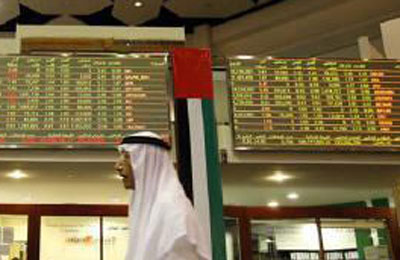
Dubai stocks sink 7pc, lead regional drop on Syria
Dubai, August 27, 2013
Dubai's stock market tumbled 7.0 percent on Tuesday, its heaviest one-day loss since the emirate's corporate debt crisis in November 2009, as it led a regional sell-off on worries about an escalation of Syria's civil war.
Dubai's index sank to 2,550 points, cutting its year-to-date gains to 57.7 percent. Margin calls hit local individual investors, who were net sellers according to bourse data, while foreigners were net buyers.
Saudi Arabia tumbled 4.1 percent, its largest one-day loss since August 2011, to below the psychologically important 8,000-point level.
The heavyweight petrochemicals sector slid 3.5 percent despite rising global oil prices, while the banking sector, the other main weight in the market, also fell 3.5 percent.
Western powers told the Syrian opposition to expect a Western strike against President Bashar Al-Assad's forces within days, after determining his government was responsible for the use of chemical weapons, sources told Reuters.
It is by no means clear that an escalation of the fighting in Syria would have any impact on Gulf economies. Although it is possible that Damascus and its allies could mount covert action against the Gulf, such action would probably not change positive long-term economic prospects.
Several Gulf countries including Saudi Arabia have already been supporting Syrian rebels for many months with no negative consequences. Geopolitical tensions can actually benefit the Gulf in one way by pushing up global oil prices.
But Gulf markets were near multi-year highs, so they were vulnerable to a sudden wave of profit-taking by the retail investors who have dominated trade in recent weeks and wanted to lock in gains.
"Politically, the region is a mess and concerns about the war in Syria are high," said Yassir Mckee, wealth manager at Qatar's Al Rayan Financial Brokerage.
"But the extent of the drop doesn't make sense and people are over-reacting because local fundamentals are strong and even if there is a war, I don't see it significantly impacting Gulf countries."
Margin calls may keep Dubai under pressure on Wednesday but there is no sign that the positive long-term technical outlooks of Dubai and most other Gulf markets have changed. Tuesday's slide brought Dubai back to its levels of just a month ago.
Dubai's index is long-term bullish after July's decisive break above major resistance on the October 2009 peak of 2,409 points; that triggered a double bottom formed by the 2009 and 2010 lows and pointing up to around 3,300 points in the very long run. Immediate chart support is at the 2,500-point level, where the market peaked in June and found support in July.
RETAIL TRADERS
Abu Dhabi's measure lost 2.8 percent on Tuesday while Kuwait's benchmark fell 2.9 percent.
Retail traders dominate in Kuwait's market after a sharp early-year rise pushed it up to levels not seen in more than four years. The market is still up 30.9 percent year-to-date.
"Nothing that's happening has to do with Kuwait - companies' financials are good and there's no reason for the market to fall except geopolitical risk," said Fouad Darwish, head of brokerage services at Global Investment House.
TUESDAY'S HIGHLIGHTS
DUBAI: The index tumbled 7.0 percent to 2,550 points.
ABU DHABI: The index fell 2.8 percent to 3,822 points.
KUWAIT: The index retreated 2.9 percent to 7,766 points.
SAUDI ARABIA: The index dropped 4.1 percent to 7,723 points.
QATAR: The index fell 1.3 percent to 9,771 points.
EGYPT: The index declined 2.0 percent to 5,338 points.
OMAN: The index retreated 1.1 percent to 6,846 points.
BAHRAIN: The index fell 1.2 percent to 1,186 points.







